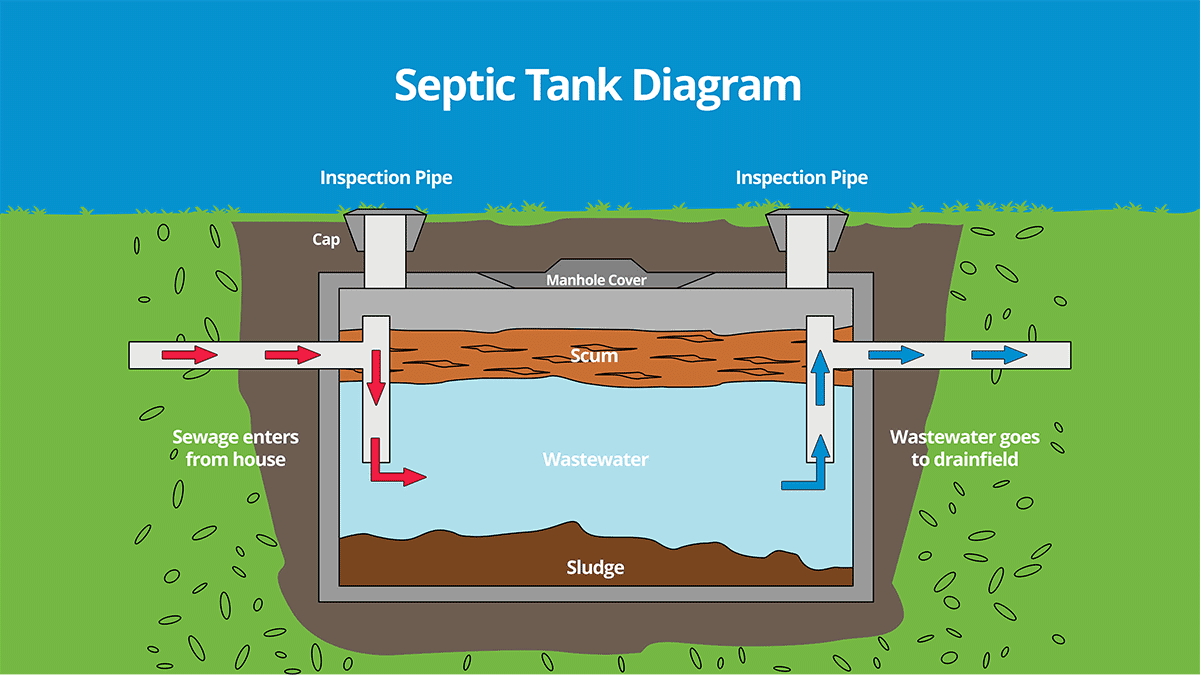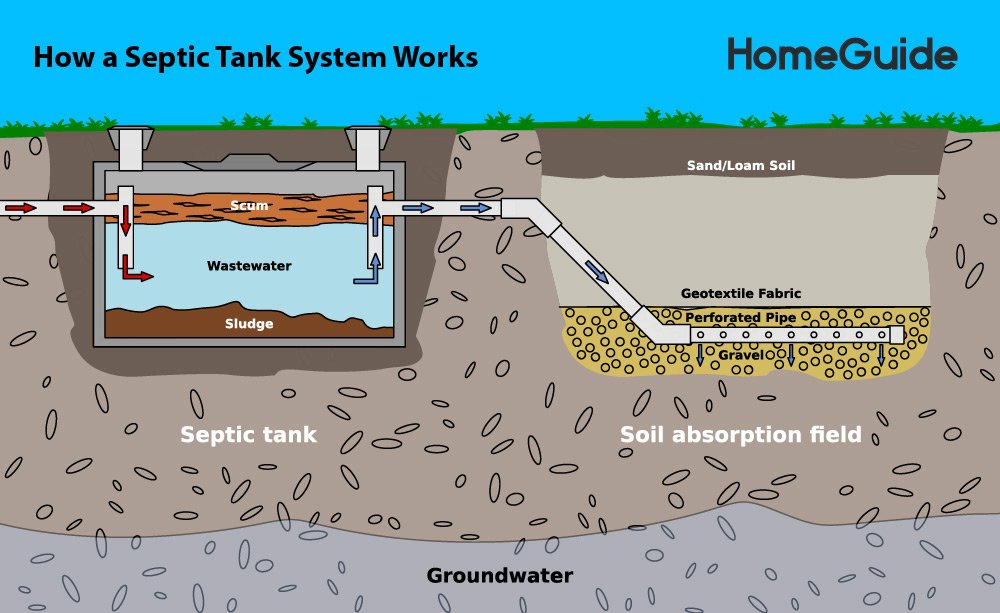If you’re a homeowner with a septic tank, you may find yourself wondering about the cost of emptying it. After all, regular maintenance is crucial to keep your septic system functioning properly. In this article, we’ll explore the factors that influence the cost of septic tank emptying, from tank size to location, and provide some valuable tips to help you budget for this essential service. So, whether you’re new to septic tanks or simply seeking information on pricing, read on to discover the ins and outs of emptying a septic tank and ensure a smooth and hassle-free process.

This image is property of www.checkatrade.com.
Factors Affecting the Cost of Septic Tank Emptying
Location
One of the main factors that affects the cost of septic tank emptying is the location of the property. The cost can vary depending on whether you live in a rural area or in a more densely populated urban area. In rural areas, it can be more expensive to empty a septic tank due to the distance that the pumping truck needs to travel. On the other hand, in urban areas, the cost may be lower as there are often more septic tank cleaning services available, leading to increased competition and lower prices.
Tank Size
The size of your septic tank is another important factor to consider when determining the cost of emptying it. Smaller tanks may require more frequent pumping, resulting in higher costs over time. Larger tanks, on the other hand, can hold more waste and may not need to be emptied as often. It is important to know the size of your septic tank in order to estimate the cost of emptying it more accurately.
Accessibility
The accessibility of your septic tank also plays a role in the cost of emptying it. If your septic tank is buried deep underground or is difficult to access due to landscaping or other obstacles, it may require more effort and time for the septic tank cleaning service to complete the job. This additional effort and time can result in higher costs.
Level of Effort
The level of effort required to empty a septic tank can vary depending on various factors such as the condition of the tank and the amount of waste that needs to be removed. If your septic tank has not been regularly maintained or is in poor condition, it may require more effort and time to empty it. In such cases, the cost may be higher due to the increased level of effort required.
Frequency of Pumping
The frequency at which you pump your septic tank can also impact the cost. Regularly pumping your septic tank is essential to maintain its efficiency and prevent costly repairs. If you neglect regular pumping and allow your tank to become too full, it may require more effort and time to empty, resulting in higher costs. It is recommended to follow the recommended pumping schedule based on your tank size and household usage to avoid unnecessary expenses.
Average Cost of Septic Tank Emptying
National Average
The national average cost of septic tank emptying in the United States can vary depending on several factors, including the ones mentioned earlier. On average, you can expect to pay between $200 and $600 for a septic tank emptying service. However, it is important to note that this is just an estimate and the actual cost may vary based on your specific circumstances.
Regional Variations
It is also important to consider regional variations in septic tank emptying costs. Prices can vary significantly from one area to another due to differences in local competition, availability of septic tank cleaning services, and the overall cost of living. For example, in rural areas or areas with limited service providers, the cost may be higher due to increased travel time and limited options.
Additional Costs
In addition to the basic cost of emptying the septic tank, there may be additional costs to consider. Some septic tank cleaning services may charge extra fees for services such as inspection, disposal, or any additional work required to repair or replace components of the septic system. It is important to inquire about these additional costs upfront to avoid any surprises when receiving the final invoice.

This image is property of www.checkatrade.com.
Septic Tank Cleaning Services
Professional Pumping Services
Hiring a professional septic tank cleaning service is often the most convenient and efficient way to empty your septic tank. These companies have the necessary equipment and expertise to complete the job quickly and effectively. The cost of professional pumping services can vary depending on the factors mentioned earlier, but it is generally higher compared to other options.
DIY Pumping
For those who prefer a more hands-on approach or want to save money, it is possible to empty a septic tank on your own. However, this option requires more time, effort, and knowledge about septic system maintenance. DIY pumping may be more suitable for those with smaller septic tanks and basic plumbing skills. It is important to ensure that you have the necessary equipment and follow proper safety precautions when attempting to empty your septic tank on your own.
Cost Breakdown of Professional Pumping Services
Pumping Fee
The pumping fee is the main component of the cost when hiring a professional septic tank cleaning service. This fee covers the labor, time, and equipment required to pump the waste from your septic tank. The price of the pumping fee can vary depending on the factors mentioned earlier, such as tank size and accessibility.
Disposal Fee
Once the waste has been pumped out of your septic tank, it needs to be properly disposed of. The disposal fee covers the cost of transporting the waste to a designated facility for proper treatment and disposal. This fee can vary depending on the distance to the disposal facility and any specific regulations or fees imposed by local authorities.
Inspection Fee
Some septic tank cleaning services may offer additional inspection services to assess the overall condition of your septic system. This can help identify any potential issues or maintenance needs. The inspection fee covers the cost of the inspection and any additional recommendations or reports provided by the service provider.
Additional Services
Depending on the specific needs of your septic system, there may be additional services required during the septic tank emptying process. This could include tasks such as repairs, replacements, or maintenance work. The cost of these additional services will vary depending on the extent of the work required and any materials or parts needed.

This image is property of media.angi.com.
Cost Breakdown of DIY Pumping
Equipment Rental
If you choose to empty your septic tank on your own, you will need to rent or purchase the necessary equipment. This may include a pumping truck, hoses, and other tools required for the job. The cost of equipment rental will vary depending on the duration of the rental and the equipment provider.
Disposal Costs
Similar to professional pumping services, you will also need to consider the cost of properly disposing of the waste once it has been pumped out of your septic tank. This may involve renting a vehicle to transport the waste to a disposal facility and paying any associated fees for treatment and disposal. It is important to inquire about these costs in advance to ensure that you have a clear understanding of the total expenses involved.
Importance of Regular Septic Tank Maintenance
Prevent Expensive Repairs
Regular septic tank maintenance, including timely emptying, is crucial to prevent expensive repairs. Neglecting maintenance can lead to significant problems such as clogs, blockages, and even complete septic system failure. These issues can be not only costly to fix but also cause inconvenience and potential health hazards. Investing in regular maintenance can help identify and address minor issues before they escalate into major and costly problems.
Maintain Healthy Septic System
Regular septic tank maintenance ensures the health and longevity of your septic system. When a septic tank becomes full and is not emptied on time, it can lead to excessive strain on the entire system. This can result in malfunctioning components, inefficient wastewater treatment, and unpleasant odors. By following a proper maintenance schedule, you can ensure that your septic system remains healthy and functions effectively.
Environmental Impact
Proper septic tank maintenance also has a positive environmental impact. When a septic tank is not emptied regularly, untreated wastewater can overflow into the surrounding soil and water sources. This can lead to contamination of groundwater and nearby lakes or rivers, posing a risk to both human health and the environment. Regular maintenance helps prevent such incidents, ensuring the safe and responsible disposal of wastewater.

This image is property of www.myjobquote.co.uk.
Factors to Consider in Hiring a Septic Tank Cleaning Service
Reputation and Experience
When hiring a septic tank cleaning service, it is important to consider their reputation and experience in the industry. Look for service providers with positive customer reviews and a track record of reliable and professional service. An experienced company is more likely to have the necessary knowledge and expertise to handle any challenges that may arise during the septic tank emptying process.
Licenses and Certifications
Make sure that the septic tank cleaning service you choose has the required licenses and certifications to operate in your area. These credentials ensure that the company meets the necessary standards and regulations set by local authorities. Hiring a licensed and certified service provider provides reassurance that the job will be done properly and in compliance with all applicable regulations.
Insurance Coverage
Septic tank cleaning can involve potential risks, such as accidents or damage to your property. It is important to hire a service provider with appropriate insurance coverage. This protects you from any liability in case of accidents or damages that may occur during the septic tank emptying process.
Customer Reviews
Reading customer reviews can provide valuable insights into the quality of service provided by a septic tank cleaning company. Look for reviews that highlight positive experiences, professionalism, and reliability. This feedback can help you make an informed decision and choose a service provider that best meets your needs and expectations.
Availability
When scheduling a septic tank emptying service, it is important to consider the availability of the service provider. Some companies may have limited availability or longer waiting times, especially during peak seasons. Plan ahead and book the service in advance to ensure that your septic tank is emptied within a reasonable timeframe.
Tips for Reducing the Cost of Septic Tank Emptying
Conserving Water
One of the simplest ways to reduce the frequency of septic tank emptying and lower costs is by conserving water. Implementing water-saving techniques such as fixing leaky faucets, installing low-flow fixtures, and using efficient appliances can significantly reduce the amount of wastewater produced by your household. This not only helps the environment but also extends the time between septic tank pumpings.
Regular Inspections
Regular inspections of your septic system can help identify any issues or potential problems before they become more serious and costly to fix. By detecting minor leaks, cracks, or blockages early on, you can address them promptly and prevent further damage or deterioration. Inspections can be conducted by professional septic tank cleaning services or by hiring a licensed inspector.
Efficient Water Usage
In addition to conserving water, using water efficiently can also help reduce the frequency of septic tank emptying. Avoid excessive water usage, such as running the dishwasher or washing machine with partial loads. Spread out water usage throughout the day instead of overwhelming the system with large volumes of wastewater at once. These small changes in water usage habits can make a significant difference in the maintenance requirements of your septic system.
Proper Waste Disposal
Proper waste disposal is essential to maintain the health and efficiency of your septic system. Avoid flushing or draining items that can clog or damage the system, such as non-biodegradable materials, grease, or chemicals. Dispose of hazardous wastes at designated collection sites instead of flushing them down the toilet or sink. By ensuring that only appropriate materials enter your septic system, you can reduce the risk of clogs and extend the time between pumpings.

This image is property of cdn.homeguide.com.
Common Signs Indicating the Need for Septic Tank Emptying
Slow Draining Fixtures
If you notice that sinks, showers, or toilets are draining slower than usual, it may be a sign that your septic tank needs to be emptied. A full tank can cause a backup in the drainage system, resulting in slower draining fixtures. If multiple fixtures in your home are experiencing this issue, it is recommended to contact a septic tank cleaning service to assess the situation and empty the tank if necessary.
Foul Odors
Unpleasant odors coming from your drains, toilets, or even your yard can indicate a full septic tank. As the tank reaches its capacity, the odor of decomposing waste can seep into your home or surrounding areas. If you notice persistent foul smells, especially near the septic tank or drain field, it is important to have the tank emptied as soon as possible to prevent further odor-related issues.
Gurgling Sounds
Strange gurgling or bubbling sounds coming from your drains, toilets, or plumbing fixtures can be a sign of a full septic tank. As the tank gets closer to its capacity, the air trapped inside can escape through the drains, causing unusual noises. If you experience frequent gurgling sounds when using your plumbing fixtures, it is best to consult a professional to assess the situation and determine if your septic tank needs emptying.
Overflowing Toilets or Drains
One of the most obvious signs of a full septic tank is toilet or drain overflow. If wastewater starts to back up into your toilets, sinks, or showers, it indicates that the septic tank is unable to handle the incoming wastewater. This is a serious issue that requires immediate attention, as it poses health risks and can cause significant damage to your property. Contact a septic tank cleaning service right away to address the problem and empty the tank.
Consequences of Neglecting Septic Tank Maintenance
Clogs and Blockages
Neglecting regular septic tank maintenance can lead to clogs and blockages in your plumbing system. When a septic tank becomes too full and is not emptied on time, the excess waste can clog the pipes and cause backups in your drains and toilets. Clearing these clogs can be time-consuming and expensive, especially if they have caused damage to the plumbing system.
Sewage Backup
A neglected septic tank can eventually lead to sewage backup, which is not only unpleasant but also poses serious health risks. Sewage backup occurs when the materials inside the septic tank overflow into the drain field or even back up into your home. This can result in extensive damage to your property and requires immediate professional intervention to address the issue.
Septic System Failure
Perhaps the most severe consequence of neglecting septic tank maintenance is complete septic system failure. When a septic tank is not regularly emptied, it can become overloaded with waste and cease to function properly. A failed septic system requires expensive repairs or even complete replacement, causing significant inconvenience and costs. Preventing septic system failure through regular maintenance is crucial to avoid these costly and disruptive scenarios.
In conclusion, septic tank emptying is an essential part of septic system maintenance. Factors such as location, tank size, accessibility, level of effort required, and frequency of pumping can all affect the cost of septic tank emptying. While the national average cost ranges from $200 to $600, regional variations and additional costs should be considered. Hiring a professional septic tank cleaning service or opting for DIY pumping are two options with their own cost breakdowns. Regular maintenance is important to prevent expensive repairs, maintain a healthy septic system, and minimize the environmental impact. When choosing a septic tank cleaning service, factors such as reputation, licenses, insurance, customer reviews, and availability should be taken into account. There are also various tips for reducing the cost of septic tank emptying, including water conservation, regular inspections, efficient water usage, and proper waste disposal. Recognizing common signs indicating the need for septic tank emptying is crucial to avoid complications such as slow draining fixtures, foul odors, gurgling sounds, and overflowing toilets or drains. Neglecting septic tank maintenance can result in clogs, sewage backup, and septic system failure, leading to expensive repairs and inconvenience. By understanding the factors and following the necessary maintenance practices, you can ensure the smooth operation of your septic system and minimize costs in the long run.

